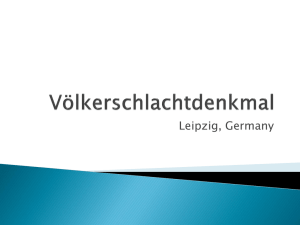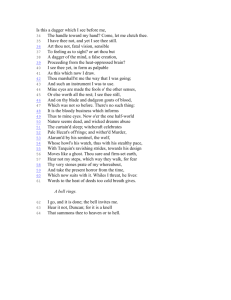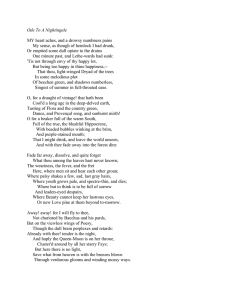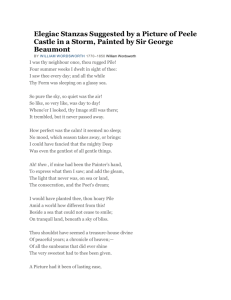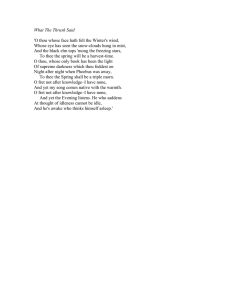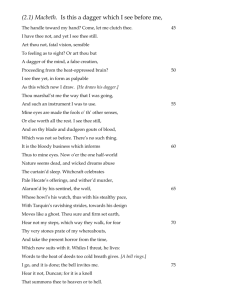S Y M P O S I U M
advertisement
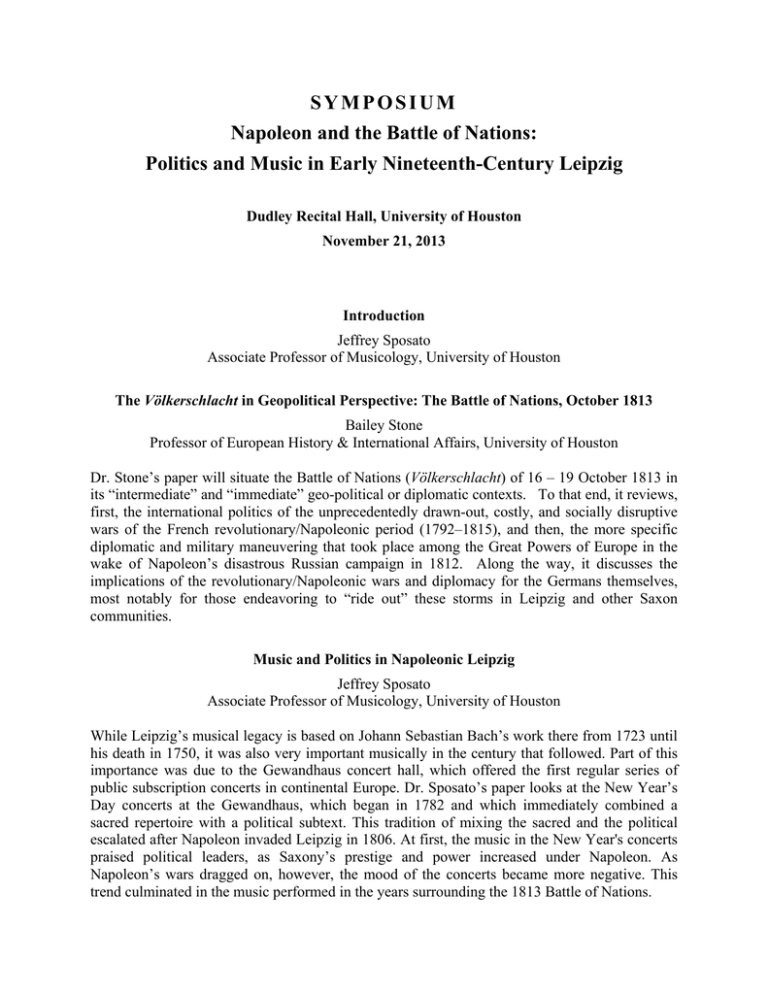
SYMPOSIUM Napoleon and the Battle of Nations: Politics and Music in Early Nineteenth-Century Leipzig Dudley Recital Hall, University of Houston November 21, 2013 Introduction Jeffrey Sposato Associate Professor of Musicology, University of Houston The Völkerschlacht in Geopolitical Perspective: The Battle of Nations, October 1813 Bailey Stone Professor of European History & International Affairs, University of Houston Dr. Stone’s paper will situate the Battle of Nations (Völkerschlacht) of 16 – 19 October 1813 in its “intermediate” and “immediate” geo-political or diplomatic contexts. To that end, it reviews, first, the international politics of the unprecedentedly drawn-out, costly, and socially disruptive wars of the French revolutionary/Napoleonic period (1792–1815), and then, the more specific diplomatic and military maneuvering that took place among the Great Powers of Europe in the wake of Napoleon’s disastrous Russian campaign in 1812. Along the way, it discusses the implications of the revolutionary/Napoleonic wars and diplomacy for the Germans themselves, most notably for those endeavoring to “ride out” these storms in Leipzig and other Saxon communities. Music and Politics in Napoleonic Leipzig Jeffrey Sposato Associate Professor of Musicology, University of Houston While Leipzig’s musical legacy is based on Johann Sebastian Bach’s work there from 1723 until his death in 1750, it was also very important musically in the century that followed. Part of this importance was due to the Gewandhaus concert hall, which offered the first regular series of public subscription concerts in continental Europe. Dr. Sposato’s paper looks at the New Year’s Day concerts at the Gewandhaus, which began in 1782 and which immediately combined a sacred repertoire with a political subtext. This tradition of mixing the sacred and the political escalated after Napoleon invaded Leipzig in 1806. At first, the music in the New Year's concerts praised political leaders, as Saxony’s prestige and power increased under Napoleon. As Napoleon’s wars dragged on, however, the mood of the concerts became more negative. This trend culminated in the music performed in the years surrounding the 1813 Battle of Nations. —————————————— INTERMISSION: A Preview of Saturday’s “Napoleon and the Battle of Nations” Concert Te Deum in D Major I. “Te Deum laudamus” II. “Salvum fac” III. “Et rege eos” Johann Adolf Hasse (1699–1783) Melissa Givens, Kayla Wright, Emily Premont, and Blythe Hopson, soloists Des Staubes eitle Sorgen Joseph Haydn (1732–1809) Andreea Muţ, piano Besty Weber, choral preparation Antoine Plante, conductor —————————————— Savior, Demi-god, or “Patricial Demon Spawned by Hell”— Napoleon and the German Literary Imagination” Hildegard Glass Associate Professor of German, University of Houston Examining works by Heinrich Heine, E. T. A. Hoffmann, Heinrich von Kleist and others, Dr. Glass’s paper traces the intense preoccupation with the figure of Napoleon—sometimes referred to as the German “cult of Napoleon”—from the demise of the Holy Roman Empire in 1806 to the 1848 revolution. Giving rise to conflicting and polarizing images of the French emperor and of the Wars of Liberation, the discussed works are actively engaging in broader debates about national identity, the Volk, progress, and individual as well as political liberty. Leipzig and the Napoleonic Wars: Direct Impact and Long-Term Consequences for Urban Mentality and Cultural Life Anselm Hartinger Instrument Curator, Württembergisches Landesmuseum Stuttgart Dr. Hartinger’s paper examines the special position of Leipzig as the cultural core and economic capitol of Saxony in the era of the Napoleonic wars—both profiting and suffering from French, Saxon and allied politics. The example of the University Church (St. Paul) shows the direct impact and the damage of the Battle of Nations, and the surprising speedy recovery of Leipzig and its cultural life after 1813. Despite the fatal consequences of his military actions, contemporary sources reveal an enduring (and often hidden) sympathy for Napoleon, one still found today in Leipzig public memory and even in the marketing activities of the 2013 anniversary. Lecturer Biographies Bailey Stone, Professor of European History & International Affairs at the University of Houston, has published many books over the last several decades, including: The Parlement of Paris, 1774-1789 (University of North Carolina Press), The French Parlements and the Crisis of the Ancien Régime (The University of North Carolina Press), The Genesis of the French Revolution (Cambridge University Press), Reinterpreting the French Revolution (Cambridge University Press), and The Anatomy of Revolution Revisited: A Comparative Analysis of England, France, and Russia (Cambridge University Press). Jeffrey Sposato is associate professor of musicology at the Moores School of Music. He received a PhD in musicology from Brandeis University, an MM and BM in vocal performance from New England Conservatory, and a BA in German studies from Tufts University. Sposato’s most recent book, The Price of Assimilation: Felix Mendelssohn and the Nineteenth-Century Anti-Semitic Tradition (Oxford, 2006), was named a Choice Outstanding Academic Title for 2006 and a Royal Philharmonic Society Music Award finalist. His other publications include William Thomas McKinley: A Bio-Bibliography (Greenwood, 1995), as well as numerous articles on Mendelssohn and Leipzig church and concert traditions. He is currently working on a new book examining those traditions, tentatively titled Leipzig After Bach: Church and Concert Life in a German City, 1750–1850. Hildegard Glass is Associate Professor of German in the Department of Modern and Classical Languages and Chair of MCL. She holds M.A. degrees in German Literature and American Studies from the Freie Universität Berlin and a Ph.D. in German Literature from the University of Texas at Austin. She has published on imaginary cities and literary utopias in Wilhelminian Germany and on the early twentieth century German avant-garde. She teaches a wide range of undergraduate and graduate courses on nineteenth and twentieth-century German literature and cultural history, including “Paris-Berlin: Tales of Two Cities,” “Writing Holocausts: Literatures of Genocide,” and post-reunification Germany. Anselm Hartinger is a graduate of the St. Thomas School and Leipzig University, where he studied history and musicology. He served as a research assistant at the Bach Archiv Leipzig from 2003 to 2006, and at the Schola Cantorum Basiliensis from 2006 to 2011. He is currently the curator for musical instruments at the Württembergisches Landesmuseum Stuttgart and scientific advisor to the J.S. Bach foundation in St. Gallen. In 2009, Hartinger completed his PhD at Philipps University in Marburg, having written his dissertation on Leipzig musical life and Bach performances during the era of Mendelssohn, Schumann, and Hauptmann (1829–1852). He is the author (together with P. Diessner) of Bach-Mendelssohn-Schumann: Spaziergänge durch das musikalische Leipzig, and of numerous articles on the musical history of Leipzig and its university, Bach reception in the eighteenth and nineteenth centuries, the history of performance practice and improvisation, and Felix Mendelssohn Bartholdy. Hartinger has also worked for the Leipzig Stadtgeschichtliches Museum, where he organized and led guided tours to the city’s historic sites and to the various 1813 Battle of Nations battlegrounds. Texts and Translations Te Deum laudamus: te Dominum confitemur. Te aeternum Patrem, omnis terra veneratur. Tibi omnes angeli, tibi caeli et universae potestates: tibi Cherubim et Seraphim incessabili voce proclamant: Sanctus, Sanctus, Sanctus Dominus Deus Sabaoth. Pleni sunt caeli et terra maiestatis gloriae tuae. Te gloriosus Apostolorum chorus, te Prophetarum laudabilis numerus, te Martyrum candidatus laudat exercitus. Te per orbem terrarum sancta confitetur Ecclesia, Patrem immensae maiestatis; venerandum tuum verum et unicum Filium; Sanctum quoque Paraclitum Spiritum. Tu Rex gloriae, Christe. Tu Patris sempiternus es Filius. Tu, ad liberandum suscepturus hominem, non horruisti Virginis uterum. Tu, devicto mortis aculeo, aperuisti credentibus regna caelorum. Tu ad dexteram Dei sedes in gloria Patris. Judex crederis esse venturus. Te ergo quaesumus, tuis famulis subveni, quos pretioso sanguine redemisti. Aeterna fac cum sanctis tuis in gloria numerari. We praise thee, O God, we acknowledge thee to be the Lord. All the earth doth worship thee, the Father everlasting. To thee all Angels cry aloud, the heavens and all the powers therein. To thee Cherubim and Seraphim continually do cry, Holy, Holy, Holy, Lord God of Sabaoth; Heaven and earth are full of the Majesty of thy glory. The glorious company of the Apostles, the goodly fellowship of the Prophets, [and] The noble army of Martyrs praise thee. The holy Church throughout all the world doth acknowledge thee; The Father of an infinite Majesty; Thine honorable, true and only Son; Also the Holy Ghost the Comforter. Thou art the King of Glory O Christ. Thou art the everlasting Son of the Father. When thou tookest upon thee to deliver man, thou didst not abhor the Virgin's womb. When thou hadst overcome the sharpness of death, thou didst open the kingdom of heaven to all believers. Thou sittest at the right hand of God, in the glory of the Father. We believe that thou shalt come to be our Judge. We therefore pray thee, help thy servants whom thou hast redeemed with thy precious blood. Make them to be numbered with thy Saints, in glory everlasting. Salvum fac populum tuum, Domine, et benedic hereditati tuae. O Lord, save thy people and bless thine heritage. Et rege eos, et extolle illos usque in aeternum. Per singulos dies benedicimus te; et laudamus nomen tuum in saeculum, et in saeculum saeculi. Dignare, Domine, die isto sine peccato nos custodire. Miserere nostri, Domine, miserere nostri. Fiat misericordia tua, Domine, super nos, quemadmodum speravimus in te. In te, Domine, speravi: non confundar in aeternum. Govern them and lift them up forever. Day by day we magnify thee; And we worship thy Name ever world without end. Vouchsafe, O Lord to keep us this day without sin. O Lord, have mercy upon us, have mercy upon us. O Lord, let thy mercy lighten upon us as our trust is in thee. O Lord, in thee have I trusted, let me never be confounded. Des Staubes eitle Sorgen bethören unsre Seele, treiben zu Reu und Jammer oft das verzagte Herz. The vain cares of dust [i.e., man] bewitch our souls, and often drive the despondent heart to remorse and sorrow. O Sohn des flücht’gen Lebens, vergiss des irren Strebens; ein Traum ist Erdenglück. Drum trockne deine Zähren, blick auf zu bessern Sphären, wo ew’ger Friede wohnt. O son of this fleeting life, forget your misguided aspirations; Earthly happiness is a dream. So dry your tears, gaze upward toward better spheres, where eternal peace dwells.
